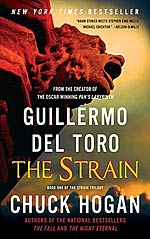
![]() jynnantonnyx
jynnantonnyx
1/2/2013
![]()
Every vampire story writer wants to make the genre his own, for good or ill. There seems to be an unspoken competition as to who can come up with the most interesting "rules" for the nature of vampires, particularly their strengths and weaknesses. Often this just gets silly (sparkles, anyone?), but occasionally it gets fascinating, and the choices an author makes sometimes has a deeper philosophy at its root. Why else would so many post-religious authors make a point of laughing at characters who think that vampires will be afraid of crosses? Why else would some writers re-imagine vampirism as a biological plague instead of a more spiritual threat? The authors of The Strain make both these changes, and also re-think the bodily structure of the vampire while they're at it. No longer a long-fanged pretty boy with mesmerizing eyes, the vampire here drinks its victim's blood through a sucker in its overgrown tongue and spreads its curse through virus-like worms.
This is film director Guillermo del Toro's first novel, though not professional novelist Chuck Hogan's first by a long shot. It's not entirely clear which co-author took what responsibilities when writing this story, but my suspicion is that del Toro wrote the outline while Hogan wrote the prose. Based on this assumption, I have to place the blame for many of The Strain's rough patches on Hogan. Too many times Hogan showcases the research he put into this novel in excruciating detail. While the CDC workers vest themselves in preparation for exploring the dead airplane which sets off this unfortunate chain of events, the prose describes every single part of their containment suit in the most boorish of details. Later during an eclipse, the prose is sure to remind us that a solar eclipse is more properly termed an "occultation," and proceeds to explain how odd it is that the sun's corona is much hotter than its surface. None of this really matters to the story, and it feels like filler to keep the reader from noticing how thin the plot is.
Del Toro, on the other hand, I suspect of being responsible for the vampire "redesign" and the plot. These are not beyond criticism, either. Despite the story's assertions that vampires are biological plagues, they do not really spread like a plague, except in the sense that vampirism expands and engulfs much of one city very quickly. The head vampire travels to the city in a coffin filled with his native soil, just as in Dracula, but what purpose this could serve is unknown. Those sucked dry by these vampires truly die and are brought back to life, differing from most vampire-as-virus interpretations which usually eschew resurrection. Dr. Ephraim Goodweather of the CDC can explain in the dullest detail exactly how the viral strain is rebuilding the insides of a corpse's body, but has no idea how to explain why a vampire cannot cross a body of moving water without the assistance of a mortal human. Hogan and del Toro seem to want to eat their cake, and have it too.
Some of the vampire-hunting adventures in the novel will remind readers of more than one del Toro film, as well. Crazy old European man who knows more than he seems? Right out of Cronos and Hellboy. Ultraviolet bombs set off to wipe out a large nest of vampires? I seem to remember that from Blade II. A long descent into the subway system and the many forgotten tunnels beneath it? That's practically the plot of Mimic. Some reviews I've read of The Strain's sequels complain that those books draw even more from Blade II than the first installment. Now, I have enjoyed many of del Toro's films, and I would never accuse him of being a boring filmmaker, but the plot for The Strain doesn't feel like it took anyone very long to cook up. Hogan seems to have written primarily crime and thriller fiction before this series, which could explain some of the roughness and evident discomfort in the storytelling.
If you're jonesin' for a vampire novel to read, there are far worse to read than The Strain, even if they do make for box office blockbusters. There are also, doubtless, many better novels, even better novels that approach vampirism as a straight-up biological plague. I Am Legend isn't a classic for nothing. Why don't you look through the novels tagged as "Vampires" on the site, and see what catches your eye?
I think del Toro is a talented director who will doubtless keep making enjoyable movies, and I even appreciate Hogan for writing The Town, which was recently made into a wonderful film. For whatever reason, they simply failed to make The Strain come together as a coherent and intriguing addition to the ever-growing pile of vampire literature. More's the pity.
http://blog.worldswithoutend.com/2012/11/the-strain/